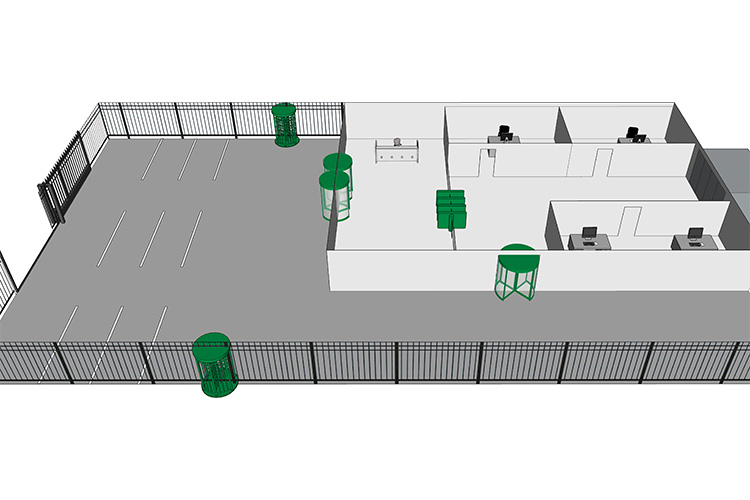Physical Security in Layers: Turnstile Locations on a Corporate Campus
June 17, 2022
Read the full original article here >
A layered physical security approach is the best way to mitigate unauthorized entry and the associated liabilities. As you move from the perimeter fenceline all the way to the most sensitive areas at the core of a corporate campus, the security entrances utilized get more sophisticated and are more effective at barring intruders from gaining access. So, with so many security doors and turnstiles on the market, how do you select the right ones for each “layer” of a building or campus?
In this blog, we’ll step through each area of a typical corporate campus and define the most effective security entrances for each location. We’re also providing an interactive infographic that outlines this same information in one clear and concise package that you can download to share with others in your organization. Click here to download the free infographic now!
1. Deterrence Layer: Fenceline Perimeter or Parking Deck | Full Height Turnstiles
Let’s start at the outermost layer of a corporate campus – the fenceline or parking deck. This is where a deterrence strategy is needed. If you are interested in restricting access from the parking lot into the campus, full height turnstiles are the ideal security entrance. These turnstiles deter unauthorized entry due to their tall stature, and mechanically allowing only one rotation per authorized credential. Physical security at this layer should not be the “end all, be all,” though, as it is still possible for two people to squeeze through the turnstile in the same compartment, and there are no sensors or alarms to alert security when that happens. As we move further into the campus, we need to increase the security level at the entry...
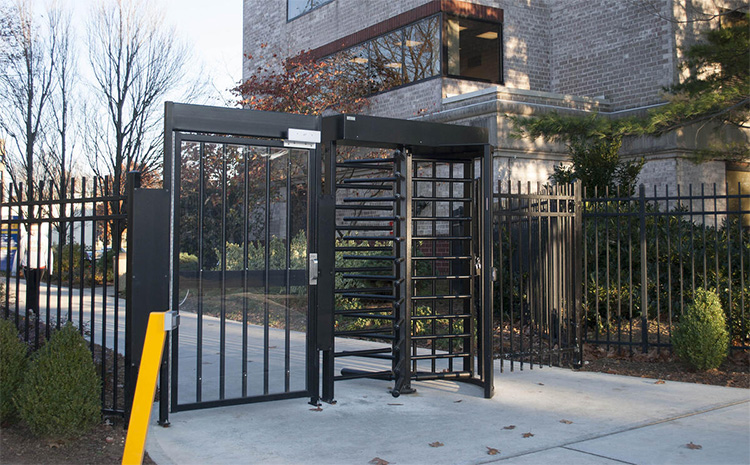
2. Detection Layer: Visitor Lobby | Optical Turnstiles & Access Gates
On most campuses, there is at least one building that processes vendors and other visitors in addition to employees. The best entry solution for this area is the optical turnstile. These sleek barrier turnstiles allow credentialed access to employees while deterring and detecting tailgating attempts by others. Reception or guard staff manning the lobby can check in vendors and visitors, providing them with a special visitor pass for entry through the turnstiles. If anyone does tailgate, the turnstile will alarm and staff can confront the tailgater immediately. Access gates are used in conjunction with optical turnstiles for ADA and cart or dolly access and remain locked until forced open by reception staff.
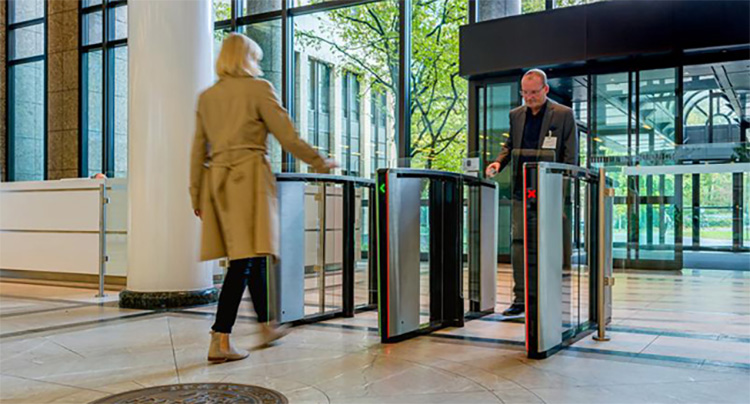
3. Prevention Layer 1: Employee-Only Entrances | Security Revolving Doors
Are there employee-only entrances at several buildings across your campus? While visitors and vendors head to the lobby, employees can “self-serve” by entering through a secured entrance just for them. Security revolving doors prevent tailgating and piggybacking without slowing down traffic during the busiest times of day, such as the morning arrival period, lunch times, and the evening departure. These doors are so good at preventing unauthorized entry, they can operate alone, without the need for manned supervision, and can provide valuable metrics unavailable with other entry types.
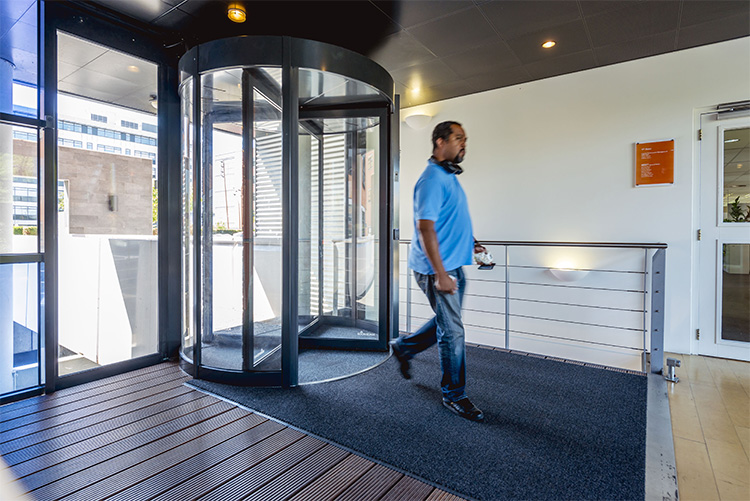
4. Prevention Layer 2: Highly Sensitive, Limited Access Areas | Security Mantrap Portals
Finally, many campuses have highly sensitive, limited interior access areas, such as executive suites, data or record centers, and stock trading floors. These locations are at the “core” of the layered physical security approach. For these locations, security mantrap portals provide the ultimate unauthorized entry assurance without the need for guard supervision. These portals involve a two-step entry process that allows only one person, the right person, access through the entrance to the secured area.
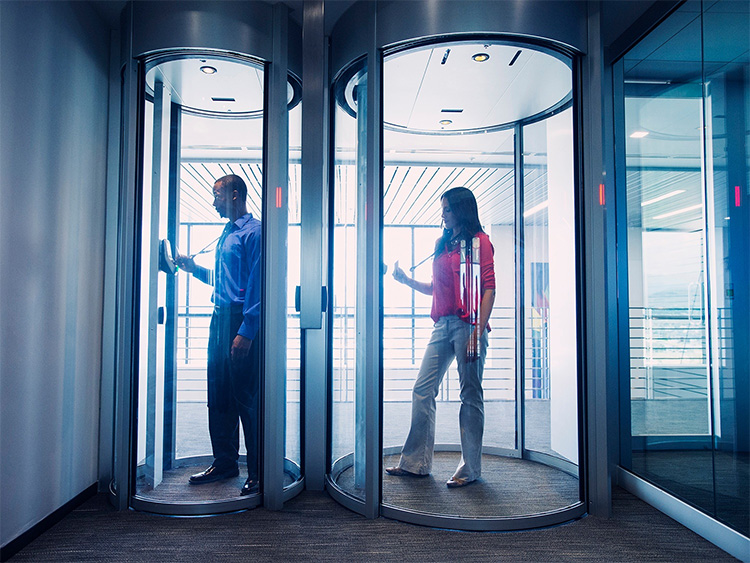
5. Additional Public Access Points | Architectural Revolving Doors
For additional public access points at buildings across the campus, architectural revolving doors are the ideal entrance solution. These manual and/or automatic revolving doors not only create a comfortable interior atmosphere and save on energy costs, but they can also be outfitted with security features. Here are some of the security options available on architectural revolving doors:
- Access control integration for after-hours access via card or biometric device
- Remote locking of the door at the push of a button in the event of exterior threats
- External night locking doors for tampering protection after-hours
These features can help increase the security level of your public entrances, but keep in mind: they do not prevent tailgating or piggybacking.
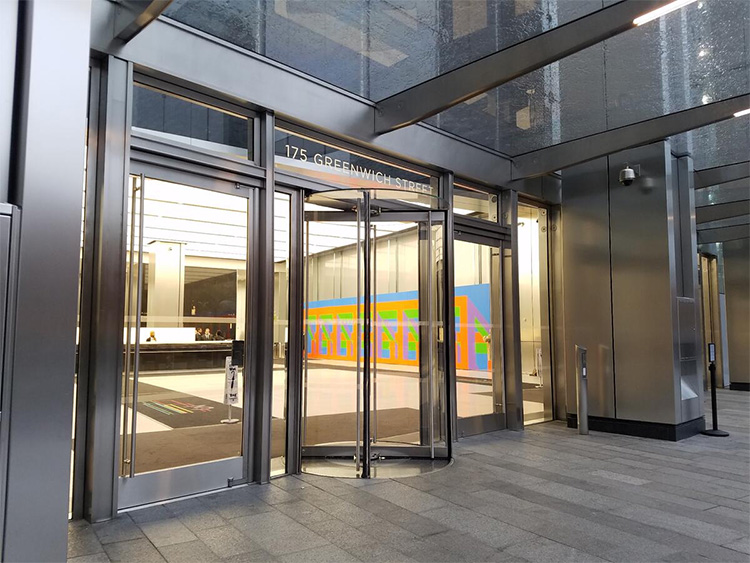
Conclusion | Download Interactive Infographic
And there are the five typical entrance points of a corporate campus with the associated secured entrance for each. While this serves as a “blueprint,” we understand that each building and campus is unique with distinctive security goals and corporate cultures. Please reach out to one of our entry experts to request an on-site or virtual entry assessment to discuss your needs today.
@BoonEdamUSA #BoonEdamUSA #security #revolvingdoors #turnstiles
Company:  Boon Edam Inc.
Boon Edam Inc.
Product: Full Height Turnstiles
Of: JC Powell
Tags:
Architecture
Design
Doors
Attack Resistant Steel Doors and Frames (June 8, 2022), Bullet Resistant Steel Doors & Frames (August 25, 2021), Impact resistant entrances: introducing the 350/500 IR Water Performance Option, a watertight option from Kawneer (August 13, 2021), Glass door security options: developing an all-glass bulletproof door (February 15, 2021)


